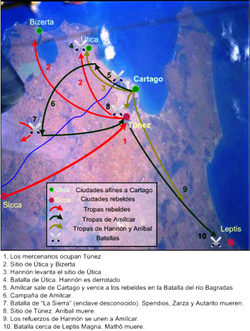Mercenary War
| Mercenary War | |||||||||
|---|---|---|---|---|---|---|---|---|---|
| Part of the Punic Wars (interlude conflict between the First and Second) |
|||||||||
 |
|||||||||
|
|||||||||
| Belligerents | |||||||||
| Carthage | Carthage's mercenary army of the First Punic War. | ||||||||
| Commanders and leaders | |||||||||
|
Hanno the Great Hamilcar Barca Hannibal†* Naravas |
Spendius† Mathos†** Autaritus† Naravas Zarzas† |
||||||||
| Strength | |||||||||
| Unknown | 90,000–100,000. 20,000 mercenaries transported from Sicily and assaulted Tunis. A further mention of "about 70,000 Libyans" later in the war. Naravas' Numidians stated at "about 2,000". | ||||||||
| Casualties and losses | |||||||||
| Unknown | High. Some 50,000 were reported killed at the Battle of "The Saw" alone. Some defected to the Carthaginians. | ||||||||
|
|||||||||
The Mercenary War (240 BC – 238 BC), also called the Libyan War and the Truceless War by Polybius, was an uprising of mercenary armies formerly employed by Carthage, backed by Libyan settlements revolting against Carthaginian control.
The war began as a dispute over the payment of money owed to the mercenaries between the mercenary armies who fought the First Punic War on Carthage's behalf, and a destitute Carthage, which had lost most of its wealth due to the indemnities imposed by Rome as part of the peace treaty. The dispute grew until the mercenaries seized Tunis by force of arms, and directly threatened Carthage, which then capitulated to the mercenaries' demands. The conflict would have ended there, had not two of the mercenary commanders, Spendius and Mathos, persuaded the Libyan conscripts in the army to accept their leadership, and then convinced them that Carthage would exact vengeance for their part in the revolt once the foreign mercenaries were paid and sent home. They also persuaded the combined mercenary armies to revolt against Carthage, and various Libyan towns and cities to back the revolt. What had been a hotly contested "labour dispute" exploded into a full-scale revolt.
Heavily outmatched in terms of troops, money, and supplies, an unprepared Carthage fared poorly in the initial engagements of the war, especially under the generalship of Hanno the Great. Hamilcar Barca, general from the campaigns in Sicily and father of Hannibal Barca, was given supreme command, and eventually defeated the rebels in 237 BC.
In 241 BC the First Punic War between Rome and Carthage came to an end with Carthaginian defeat. As part of the terms of the treaty, Rome demanded that Carthage give up "all islands lying between Sicily and Italy", immediately pay Rome a sum of 1,000 talents of gold, and pay a further 2,000 talents over a period of 10 years. After meeting the Roman demands, a destitute Carthage now found itself in a quandary: it had employed numerous mercenaries in the First Punic War and now found it difficult to pay them. During the First Punic War the Carthaginians had recruited mercenaries from diverse sources, including Iberians, Celt-Iberians, Balearic Islanders, Ligurians, Celts and Greeks.
...
Wikipedia
